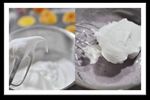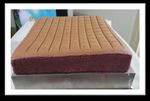PURPLE SWEET POTATO (IPOMOEA BATATAS L. LAM.) CAKES.
←
→
Page content transcription
If your browser does not render page correctly, please read the page content below
PURPLE SWEET POTATO (IPOMOEA BATATAS L. LAM.) CAKES.
Kanyapat Petcharaporn
Faculty of Science and Technology, Suan Sunandha Rajabhat University, Bangkok Thailand
E-Mail: kanyapat.pe@ssru.ac.th, Alternative email: yelly26girl@gmail.com
ABSTRACT
Bakery products are the food of westerners. Making the cakes normally it has to use
the very simple and high calories ingredients e.g. wheat flour, butter and sugar etc. From this
topic, the researcher found that the application of using purple sweet potato as a high
antioxidant level ingredient of Anthocyanin to be an interesting ingredient for making purple
sweet potato chiffon type cake can be the good way for developing of valuable bakery and
cake product and to be a new way of bakery products development that’s as a goal of the
experiment. The application of using purple sweet potato for chiffon type cake making
process by acceptance testing of 30 consumers using 5-point hedonic scale from the score 1-5
and analyzing by using statistic program with t-test, the result showed that.
The comparison of 5 factors, consumers accepted the purple sweet potato to be a new
kind of cake from every factors has the high to very high score level from scale of Best [6] so
we can conclude that the chiffon type cake from purple sweet potato can be an interesting,
valuable product and can be developed in the new things of bakery products from the new
and useful ingredient.
Keywords: purple sweet potato, cake, chiffon cake
INTRODUCTION
The word cake is of Viking origin, derived from the Norse word “kaka.” The first
cakes ever made are actually quite different from the ones we eat today. Interestingly, the
ancient Egyptians were the first culture to exhibit baking skills, and during Ancient Times the
cakes were more bread-like in appearance and sweetened with honey. The Greeks also had an
early form of cheesecake, while the Romans developed versions of fruitcakes with raisins,
nuts and other fruits. Meanwhile in mid-17th century Europe, cakes were frequently baked as
a result of advances in technology and access to ingredients. Europe is credited with the
invention of modern cakes, which were round and topped with icing. Incidentally, the first
icing was usually a boiled mixture of sugar, egg whites, and some flavorings. During this
time, many cakes still contained dried fruits, like currants and citrons.
Then, in the 19th century, cake, as we know it today, became more popular. However,
the treat was considered a luxury as sweet ingredients like sugar and chocolate were very
expensive. During this time, cakes were baked with extra refined white flour and baking
powder instead of yeast. Buttercream frostings also began replacing traditionally boiled
icings. Also, the advancements in temperature controlled ovens, a baker’s life became much
easier. No longer did the bakers have to continually watch and wait for the cake to finish
baking. Even more, the Industrial Revolution made ingredients more readily available, which
made them cheaper, so more people could bake them or even buy them at the store [1].
For cake history in Thailand, looking no different from a typical sponge cake, the
Khanom Farang cake may not appear unusually appealing, but its long, rich and interesting
history, which traces back to the Thon Buri period over two centuries ago, makes this plain
©ICBTS Copyright by Author(s) | The 2020 International Academic Multidisciplines Research Conference in Rome 42sponge more than just a desert. “Khanom Farang Kudi Chin” has become a reminder of the
long-standing relationship between the Thais and the Portuguese. The Portuguese were the
first Europeans to set foot in Siam as Thailand was known at the time, and records show that
Portuguese seamen first arrived on these shores over 500 years ago. The area's famous
sponge cake embodies the cultural assimilation that occurred among foreign settlers. While
the cake was baked in a Portuguese style, the pumpkin topping came from the Chinese who
considered it an auspicious fruit. What makes the Kudi Chin cake even more noteworthy is
that there are now only three families in the community that still make it the traditional way
using the old recipe which has been passed down from generation to generation [2].
Figure 1. "Khanom Farang Kudi Chin," a Portuguese sponge cake is a cultural icon that
bears evidence of cultural assimilation among Portuguese and Chinese migrants in Thailand
[2].
Nowadays, Cake producing business in Thailand applied some fruits such as orange,
mango, durian etc. to be a fruit ingredient of cake to improve value creation of cakes by
tropical fruit and can create more of the cake product value and price as Nattapol et al. using
the Jerusalem Artichoke (Helianthus tuberosus L.) for development of Low-Fat Chiffon
Cakes by Fat Substitution [3] so the researcher found that the application of using purple
sweet potato (Ipomoea batatas l. Lam.) as a high antioxidant level ingredient of Anthocyanin
that make food look pretty are touted to also have beneficial health effects. They eradicate
free radicals that have been attributed to causing cancer and can help protect the liver and
lower blood pressure. Purple sweet potatoes are also a good source of potassium and fiber,
and high in B6, vitamin C, and antioxidants. Additionally, they have a low glycemic index,
which is why sweet potatoes of any variety are often preferred for diabetic diet [4] to be an
interesting ingredient for making purple sweet potato chiffon type cake can be the good way
for developing of valuable bakery and cake product and to be a new way of bakery products
development that’s as a goal of the experiment.
Figure 2. Purple sweet potatoes [4].
©ICBTS Copyright by Author(s) | The 2020 International Academic Multidisciplines Research Conference in Rome 43Purple sweet potatoes (Ipomoea batatas Lam) are a direct relative of the well-known
orange sweet potato and come from the same family. The difference in color is explained by
the presence of anthocyanins and antioxidants that give the flesh its purple color as a direct
relative of the orange-fleshed variety, purple sweet potatoes are rich in essential vitamins
(including vitamin A/beta carotene, which makes this crop even more important in commonly
deficient areas in Africa) and minerals, as well as a large amount of fiber, which helps
provide the sensation of fullness and satiety. The origin of purple sweet potato traces back to
South America, but because it is such a robust farming crop, its production has spanned the
world, including Africa and China. Over time, different types have been developed including
the Okinawan, Japanese, Taiwanese, and Stokes varieties [5].
OBJECTIVE
To study the process of cake making by using the purple sweet potatoes instead some
part of wheat flour and their consumer acceptance
MATERIALS AND METHODS
1. Purple sweet potatoes preparation.
Clean and peel purple sweet potatoes, after that cut it into smaller pieces to be easier
for steaming. Put the purple sweet potatoes into the steamer and steam it for 10 minutes since
the water is boiled or steam until seeing the purple potatoes to be cooked. Once cooked, use a
clean cloth to wrap your hands and remove all the purple skins and place them in a sieve and
grate them for a fine texture as the picture shown in Figure.3
Figure 3. Purple sweet potatoes preparation process.
2. Purple sweet potato cake production.
Prepare all ingredients of batter cake production by using 80 g. of cake flour, 1
teaspoon of baking powder, ¼ teaspoon of salt, 45 g. of sugar, 65 g. of coconut milk, 40 g. of
vegetable oil, 3 egg yolks, 70 g. of steamed and sieved purple sweet potato, 2 teaspoons of
vanilla butter flavor, 3 eggs white, another 45 g. of sugar and ¼ teaspoon of cream of tartar.
Sift all the dried ingredients and mix it together after that beat another liquid ingredients in
the mixing bowl, beat the yolk part except egg white, 45 g. of sugar and cream of tartar till it
is fluffy and soft as shown in Figure 4.
Figure 4. All ingredients and mixing of egg yolk and cream of tartar.
©ICBTS Copyright by Author(s) | The 2020 International Academic Multidisciplines Research Conference in Rome 44Mixing the egg white part are egg white, 45 g. of sugar and cream of tartar by fastest
speed in the mixing bowl and whisk well until light and fluffy. Sift together the dried
ingredient. Gradually, add this to the egg yolk and egg part mixtures, mix till the batter is
fluffy and soft. Add vanilla essence and blend well. Vanilla essence is important to
camouflage the smell of eggs as shown in Figure 5.
Figure 5. Beaten of egg white part and batter of purple sweet potato cake.
Put the batter of purple sweet potato cake into the tray. Bake it at 180 degree Celsius
for 30-33 min. and transfer to racks and let cool 10 minutes, then run a knife around the edge
of the pans and turn the cakes out onto the racks to cool completely. Remove the parchment.
Trim the tops of the cakes with a long serrated knife to make them level, if desired as shown
in Figure 6.
Figure 6. Bake purple sweet potato cake.
3. Purple sweet potato cream making.
Whisk 250 g. of the steamed purple sweet potato and 100 g. of whipping
cream. Blend it well, add 30 g. of butter, 50 g. of sugar and ¼ teaspoon of salt, mix till the
batter is fluffy and soft. Trim the tops of the cakes with a long serrated knife to make them
level, cut it into the small pieces and spread it on with whisked purple sweet potato cream on
the top for decoration as shown in Figure 7.
Figure 7. Purple sweet potato cakes.
©ICBTS Copyright by Author(s) | The 2020 International Academic Multidisciplines Research Conference in Rome 454. Sensory evaluation and Statistical analysis
For sensory evaluation were from 30 volunteer consumers, students and teachers from
Suan Sunandha Rajabhat University by using 5-point hedonic scales from the score 1-5 with
5 factors consideration were texture of cake, color, taste of cake, acceptance of consumer and
overall liking. The data were analyzed by using SPSS statistic program with t-test at
significant mean difference between two sets of paired data between normal chiffon cake and
purple sweet potato cakes by using chiffon type cake making method. The determining
significant differences between testing samples at a confidence level at 95% (PACKNOWLEDGEMENTS
This research was funded the major of Home Economics by the National Research
Council of Thailand and Suan Sunandha Rajabhat University. The researcher would like to
thank Miss. Karnchana Khonchan student from our Home Economics majors for helping us
doing the laboratory and Institute of Research and Development, Suan Sunandha Rajabhat
University in the support of research grant for this work and also we would like to thank the
Committee of the Personnel Development Fund of Suan Sunandha Rajabhat University for
support registration fee and travelling expenses to join the International Academic
Multidisciplines Research Conference (ICBTS) in Rome, Italy on March 3 –6, 2020.
REFERENCES
[1] Grill, G. (2018). The History of Cakes. Retrieved October 22, 2019, from
https://garrysgrill.com/the-history-of-cakes
[2] Wancharoen, S. (2018). A delicious slice of history. Retrieved October 22, 2019, from
https://www.bangkokpost.com/thailand/special-reports/1454126/a-delicious-slice-of-
history
[3] Prathengjit, N. (2016). Development of Low-Fat Chiffon Cakes by Fat Substitution
with Jerusalem Artichoke (Helianthus tuberosus L.). The 4th Suan Sunandha
Academic National Conference (pp. 147-157). Bangkok.
[4] Schmidt, D. (2019). What Are Purple Sweet Potatoes? Buying, Cooking, and Recipes.
Retrieved October 22, 2019, from https://www.thespruceeats.com/purple-yam-purple-
sweet-potato-overview-3217089
[5] Aleksic, A. (2019). 11 Health Benefits of Purple Sweet Potato + Recipe. Retrieved
December 31, 2019, from https://selfhacked.com/blog/purple-sweet-potato
[6] Best, J. (1986). Research in Education (5th ed.). New Jersey: Prentice Hall.
©ICBTS Copyright by Author(s) | The 2020 International Academic Multidisciplines Research Conference in Rome 47You can also read

























































